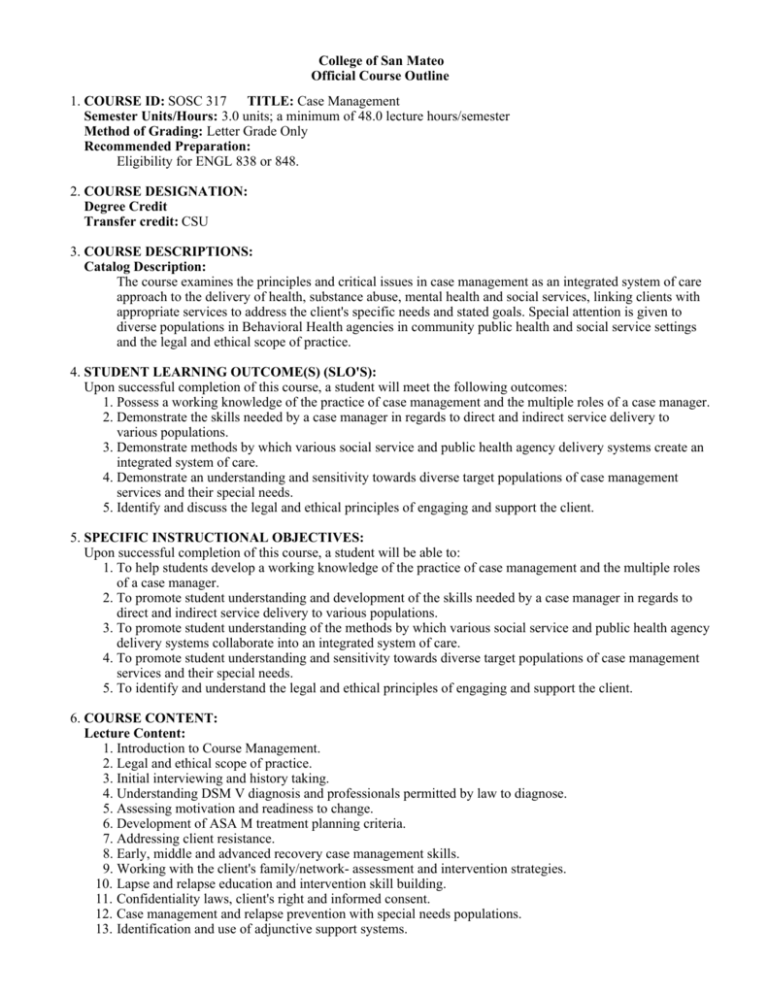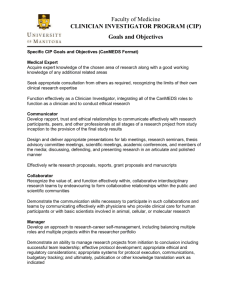SOSC 317 Case Management
advertisement

College of San Mateo Official Course Outline 1. COURSE ID: SOSC 317 TITLE: Case Management Semester Units/Hours: 3.0 units; a minimum of 48.0 lecture hours/semester Method of Grading: Letter Grade Only Recommended Preparation: Eligibility for ENGL 838 or 848. 2. COURSE DESIGNATION: Degree Credit Transfer credit: CSU 3. COURSE DESCRIPTIONS: Catalog Description: The course examines the principles and critical issues in case management as an integrated system of care approach to the delivery of health, substance abuse, mental health and social services, linking clients with appropriate services to address the client's specific needs and stated goals. Special attention is given to diverse populations in Behavioral Health agencies in community public health and social service settings and the legal and ethical scope of practice. 4. STUDENT LEARNING OUTCOME(S) (SLO'S): Upon successful completion of this course, a student will meet the following outcomes: 1. Possess a working knowledge of the practice of case management and the multiple roles of a case manager. 2. Demonstrate the skills needed by a case manager in regards to direct and indirect service delivery to various populations. 3. Demonstrate methods by which various social service and public health agency delivery systems create an integrated system of care. 4. Demonstrate an understanding and sensitivity towards diverse target populations of case management services and their special needs. 5. Identify and discuss the legal and ethical principles of engaging and support the client. 5. SPECIFIC INSTRUCTIONAL OBJECTIVES: Upon successful completion of this course, a student will be able to: 1. To help students develop a working knowledge of the practice of case management and the multiple roles of a case manager. 2. To promote student understanding and development of the skills needed by a case manager in regards to direct and indirect service delivery to various populations. 3. To promote student understanding of the methods by which various social service and public health agency delivery systems collaborate into an integrated system of care. 4. To promote student understanding and sensitivity towards diverse target populations of case management services and their special needs. 5. To identify and understand the legal and ethical principles of engaging and support the client. 6. COURSE CONTENT: Lecture Content: 1. Introduction to Course Management. 2. Legal and ethical scope of practice. 3. Initial interviewing and history taking. 4. Understanding DSM V diagnosis and professionals permitted by law to diagnose. 5. Assessing motivation and readiness to change. 6. Development of ASA M treatment planning criteria. 7. Addressing client resistance. 8. Early, middle and advanced recovery case management skills. 9. Working with the client's family/network- assessment and intervention strategies. 10. Lapse and relapse education and intervention skill building. 11. Confidentiality laws, client's right and informed consent. 12. Case management and relapse prevention with special needs populations. 13. Identification and use of adjunctive support systems. 14. Ethical decision making process. 14. Ethical decision making process. 15. Reporting responsibilities for case managers. 16. Current California Laws in Mental Health and Drug and Alcohol Counseling. 17. Case manager responsibilities for self care. 18. Dual relationships. 19. Cultural diversity as an ethical issue. 20. Malpractice and unprofessional conduct. 7. REPRESENTATIVE METHODS OF INSTRUCTION: Typical methods of instruction may include: A. Lecture B. Discussion C. Observation and Demonstration 8. REPRESENTATIVE ASSIGNMENTS Representative assignments in this course may include, but are not limited to the following: Writing Assignments: Students will complete a case study paper. Reading Assignments: Weekly readings from the assigned texts. 9. REPRESENTATIVE METHODS OF EVALUATION Representative methods of evaluation may include: A. Class Participation B. Class Performance C. Exams/Tests D. Homework E. Papers 10. REPRESENTATIVE TEXT(S): Possible textbooks include: A. Corey, et al.. Issues and Ethics in the Helping Professions, 8th ed. Cengage Learning, 2010 B. Grosso, Federico. Advanced Applications of Laws and Ethics for California Drug and Alcohol Counselors, 8th ed. F.C. Grosso, 2011 C. Summers, Nancy. Fundamentals of Case Management Practice: Skills for the Human Services, 2nd ed. Cengage Learning, 2011 Origination Date: November 2013 Curriculum Committee Approval Date: March 2014 Effective Term: Fall 2014 Course Originator: Angela Stocker




